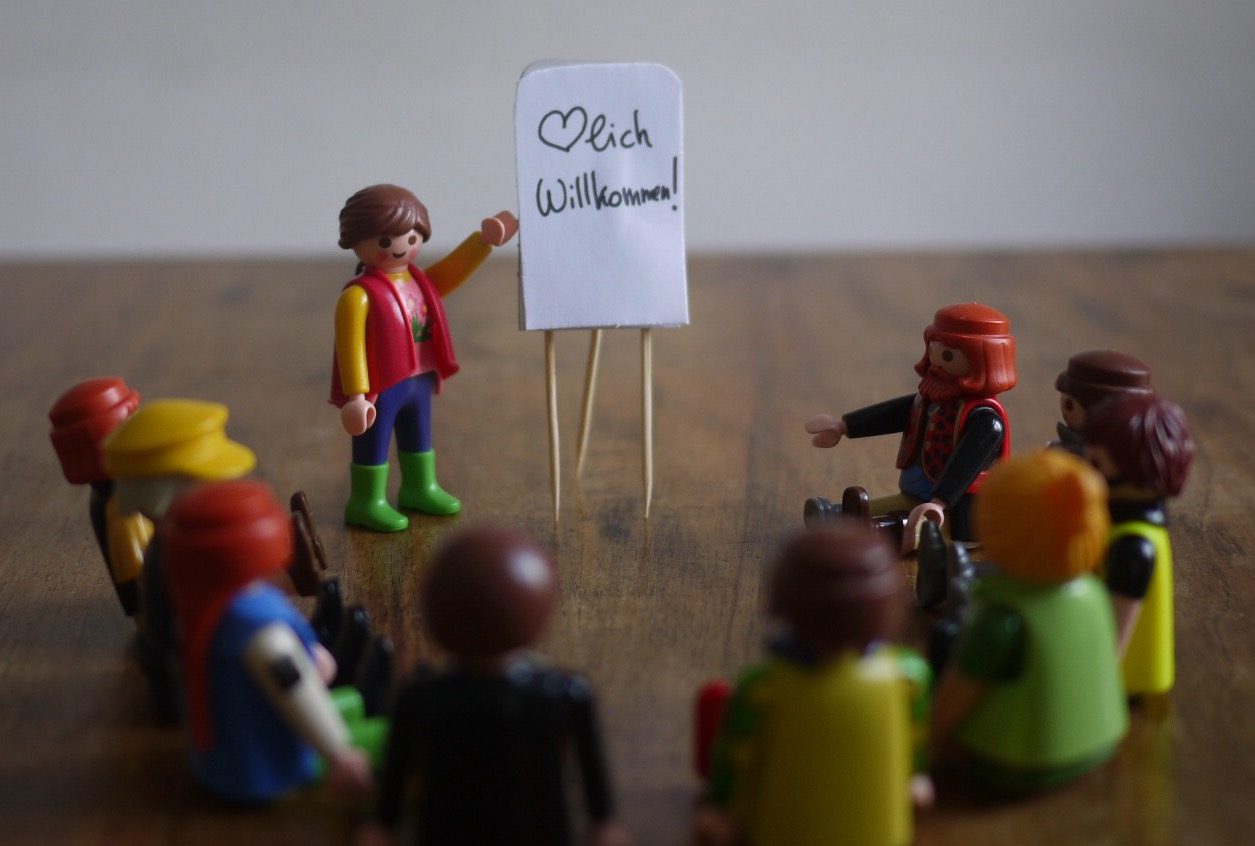What does such a long-term group actually need?
The fact that a group of people come together, get to know each other, define themselves as a „group“ and also „function“ together in the long term seems to be a completely everyday process. It happens by itself – doesn’t it? What a group needs to become and stay a group is what #grumo_02 is all about!
„I think it’s funny, but it’s the same for me every time: just before the seminar starts and the people are already arriving, I’m really annoyed. I don’t like meeting all of them, feel overwhelmed and want to leave. Usually in the afternoon of the first day, and certainly after the second day, I suddenly find the group likeable, most of the people interesting and with some of them I would be honestly interested in further conversations. Weird, isn’t it?“
Maria leans back and looks at Yasmine, who has agreed to prepare a few points of content for today’s meeting. „I feel the same way“ – Paul picks up right away – „I know that they start to grow on me after a day at the latest, but at the very beginning I would prefer not to get to know anyone at all. That’s what happened to me with us too.“ – He looks around a bit embarrassed – „On the first day of the seminar I was very busy rolling my eyes on the inside.“
Yasmin immediately adds: „It’s great that you’re jumping right into the topic! Can you determine a point in time when the rejection turned into interest?“ – Paul thinks about it for a moment: „Well, I think it was after the first morning session. I had a nice chat with Beate at lunch and then Maria sat down with us, I had been in the small group with her before, and we got on well.“ Rudi is already taking a breath to start an explanation, but Yasmine stands up and says, „Wait a minute, Rudi, you’re welcome to add to me later, but I want to introduce you to what I’ve come up with for you today.“
Framework and structure enable the group to work
„What longer-term groups need is a goal, the willingness to engage with each other and a clear framework or structure. The framework and structure for seminar groups is often given by the seminar organisation: Place, duration and at least roughly the contents. Self-organised groups – like us here – have to agree on the structure and framework themselves.“ – Everyone nods. It was not at all easy to find a suitable day and a place for the regular meeting that is reasonably easy to reach for everyone. „These are formal criteria. Now it’s about membership. The first question with teams and groups is: Who is in it? Who belongs?„
Sounds trivial, but if it’s not clear, the group will start to swirl from the beginning. If you think about seminars and people who come later, then that brings a bit of unrest into the group. Because a new person actually creates a new group. And especially at the beginning that is very noticeable. If a group has existed for a while and someone joins, there are often already clear agreements that can be discussed and negotiated. At the beginning they are still in the making and that’s why it can be really frustrating if people only join after half a day.“
Who are you…
Yasmine takes a sip from her coffee and looks at Beate. „You brought up how-are-you rounds last time. I’m a big fan of that, as well as of getting to know each other at the beginning of the seminar, and I’ll tell you why. Once it’s clear who belongs, the next step is to get to know each other a little better. Maria, you said that everyone gets on your nerves at the beginning. That’s completely understandable, so many new people are overwhelming for everyone. And some people react to insecurity by being annoyed, others become particularly funny, or withdraw completely. In order to be able to work quickly, it is important that everyone gives a little of themselves, puts something personal into the group. And for this purpose, rounds of introductions or even state-of-mind rounds are well suited. If everyone has already told a little bit about themselves, there are starting points. Like you said, Paul, that you had already chatted with Beate and Maria at lunch.“
Paul nods. Beate remains unconvinced: „I can see what you mean, but repeating the same spiel about who I am and what I do for the seventeenth time doesn’t really bring me any closer to the others.“ Yasmine laughs. „Yes, you’re right of course. For seminar-tested audiences, getting-to-know-you exercises are really a challenge. Of course, choosing an interesting method contributes a lot to how well the getting-to-know-you exercise works for the participants. There is a good collection of more innovative methods on the REFAK blog. I’ll be happy to send you the link.“
… and how are you?
„And when do you do how-are-you-doing rounds?“ Beate is still sceptical. „Well,“ says Yasmine, „I like to do short flashes, where everyone just gives a short mood picture of how they are doing. I like to do that at the end of a seminar day so that I can plan a little better for the next day. If everyone is really happy, I move on in that direction. If everyone had expected something different, I can still correct the course.
Depending on the group, I often just do thumb feedback (thumbs up, medium or thumbs down, important: all at the same time, on three). Sometimes also at the beginning of the second or third day of the seminar to get an impression of whether everyone is halfway there with their thoughts. If there has been a rather intensive, conflict-laden session, it is important for me to know before the break whether everyone can go well into the break. Then I simply ask how they are feeling on a scale of 1-10, without any explanation. For me, this is important information so that I know whether I can continue with the programme after the break or whether the conflict still needs space.“
Yasmine thinks for a moment. „But I understand your annoyance with it. There was a time when it was used a bit excessively.“ Beate frowns. „So with these scales and asking specifically if they are happy with the direction, I can already do something with that.“ Yasmin smiles and shrugs: „I think it has to suit the trainer. If it seems forced and there’s no real need behind it, then it’s best not to do it.“
Trying it out yourself
Yasmine leans back and reaches for her coffee „Our agreed time is almost up again anyway. Shall we try a round of flashing lights at the end? I’d be interested to know if you got anything out of my thoughts and how we should proceed next time.“ She blinks at Beate „Do you want to start right away?“ – „OK. I’ll keep it short: thanks for the preparation. I’ll experiment with rounds like this in the future and I’ll check out the alternative getting-to-know-you exercises on the REFAK blog too.“
Beate passes on to Paul. „I’m glad that it’s not just me who feels this way about groups at the beginning. Thank you and I would like to go further in the direction of what groups need at the beginning.“ Paul looks at Maria: „I also look at the REFAK blog. I often do flash rounds anyway and have good experiences with them.“ She continues to look at Rudi, who clears his throat, „Good introduction to the topic. Thanks a lot!“ Yasmine raises her eyebrows mischievously, „What, no additions at all?“ Rudi runs his hand over his bald head and laughs, „No. I could just repeat what you said, and that would be really unnecessary.“
Paul looks at Maria: „Hey, tell me, at the beginning of the course you always make agreements about how to work together. Maybe we should talk about that next time?“
Authors: Gerda Kolb and Irene Zavarsky
Lust auf mehr? Zu allen Beiträgen der Serie kommst du HIER!

Dieses Werk ist lizenziert unter einer Creative Commons Namensnennung-NichtKommerziell-Weitergabe unter gleichen Bedingungen unter gleichen Bedingungen 3.0 Österreich Lizenz.
Volltext der Lizenz

Dieses Werk ist lizenziert unter einer Creative Commons Namensnennung-NichtKommerziell-Weitergabe unter gleichen Bedingungen unter gleichen Bedingungen 3.0 Österreich Lizenz.
Volltext der Lizenz



